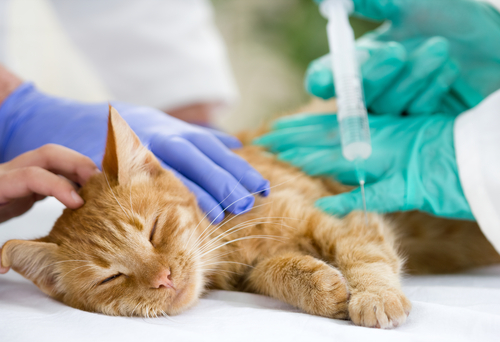
Photo: Shutterstock
Cats can be quite delicate animals and because they are generally quite aloof, symptoms of diseases may not be obvious until serious. Get your cat a check-up at the vet at least once every year. Your vet will also recommend the vaccines it needs and their schedule. If you feel your cat is ill or injured, take it to the vet at once for treatment.
Here are some common cat illnesses to watch out for in order to keep your cat in good health.
Ear mites: If your cat shows discomfort by scratching its ears a lot or shaking its head often it could have ear mites. These are usually passed on from cat to cat and a vet will be able to diagnose the problem. Your pet’s ears will have to be cleaned and medication will be recommended.
Flee infestations: Fleas can be very harmful to cats. They feed off the animals, can transmit tapeworm and cause skin irritations. If your cat has fleas, your house will as well and you will need treatment for both. Make sure you use products that are safe for cats in your house and ask your vet to recommend a flea control program suitable for your cat.
Feline Urological Syndrome (FUS): This ailment can affect male and female cats. If you see your cat going to its litter box very often, crying or straining when urinating or notice blood in its urine, get it checked with your vet. A special diet may be recommended. Male cats can have urethral obstructions that prevent them from urinating. This needs to be treated promptly or it can be life-threatening.
Worms: Worms are a common problem that affects cats. There can be several types of infections so it’s best to get your vet to properly diagnose the type of parasite present. Once diagnosed, your vet will recommend effective treatment for that particular type of infection.
Medication and pesticides: Cats are delicate creatures and special care needs to be taken regarding their medications. Don’t ever give your cat medicine that has not been approved by your vet. Common drugs, even in small doses, can be fatal to cats so keep your pills out of reach. Other household products and pesticides should always be kept away from your cat.
Neutering and spaying: By the time they are five months old, female and male cats should be spayed and neutered. The benefits for males include a decreased urge to roam and fight with other cats and it prevents or reduces their urine spraying behaviour to mark territory. For females, spaying can prevent the cat developing breast cancer and pyometra (a uterus infection), both very serious conditions.
Vaccines: As soon as you get a kitten, ask your vet about the vaccines you will need to give it and the schedule you will need to stick to in order to provide it with timely inoculations. Kittens are generally first vaccinated as young as two months old and then a few more times in the coming months. After that, yearly vaccines are usually recommended.
Please like FamiLife’s page on Facebook so that you get all our articles and others may find us.
